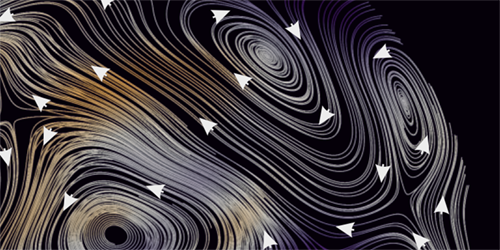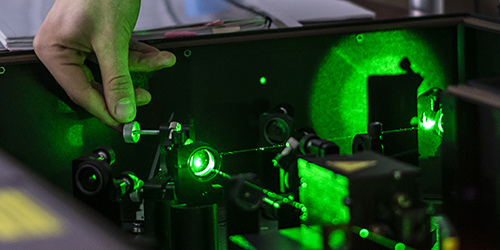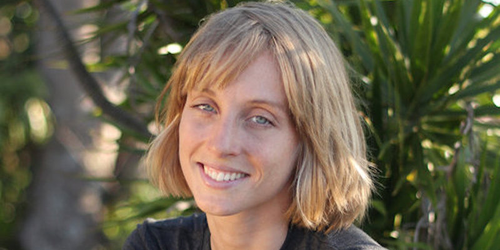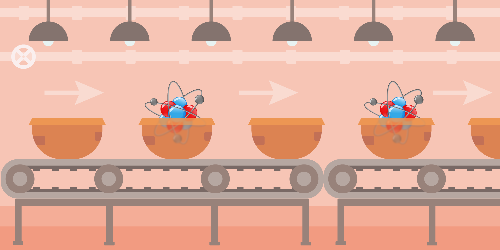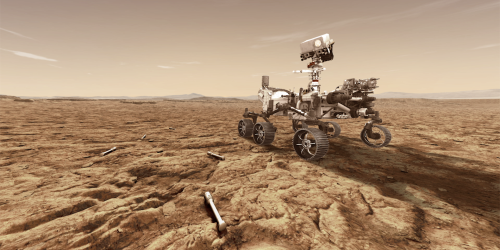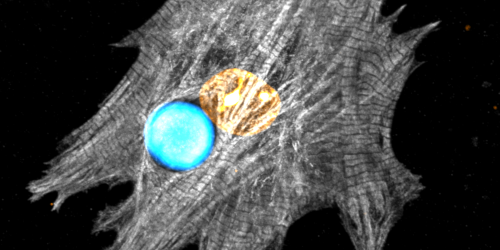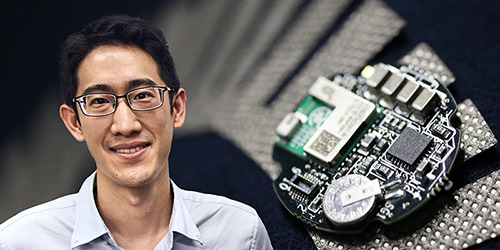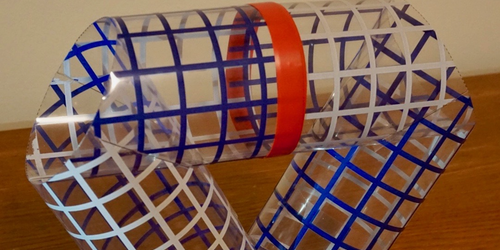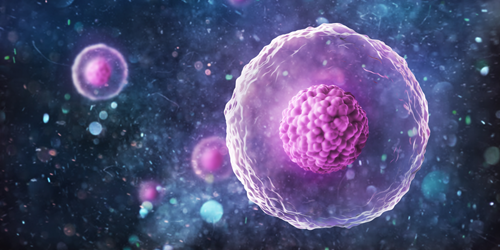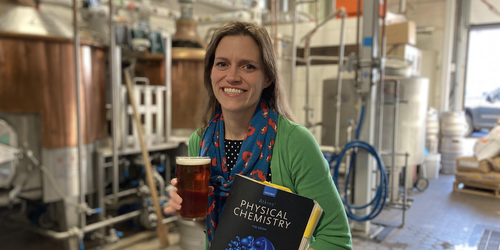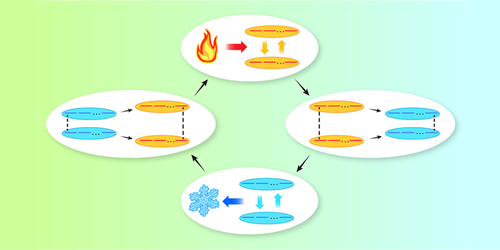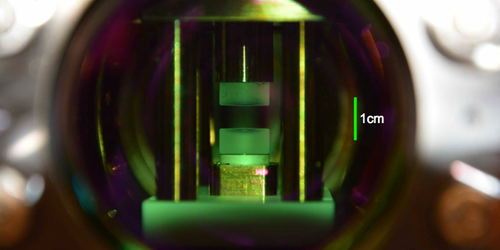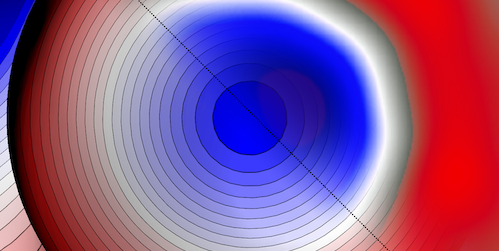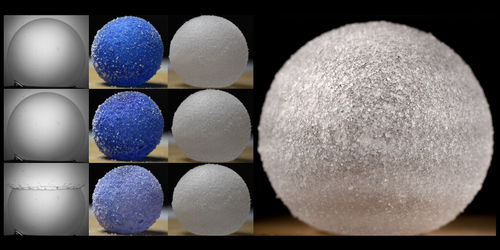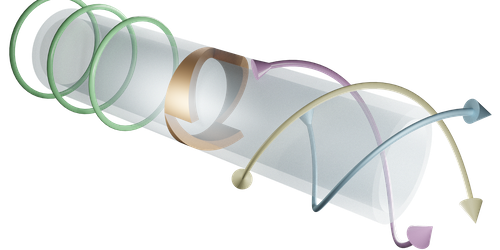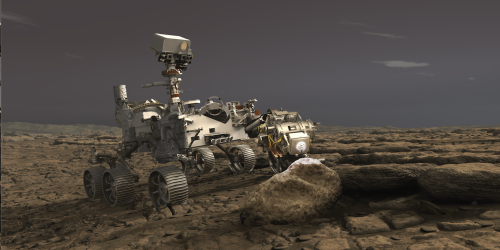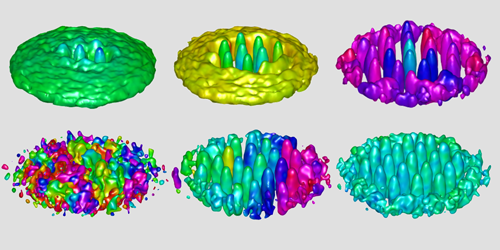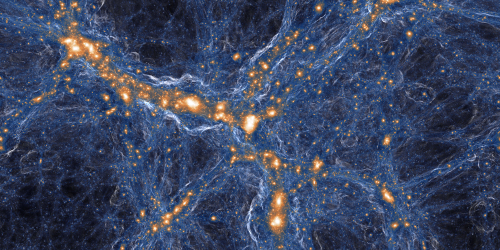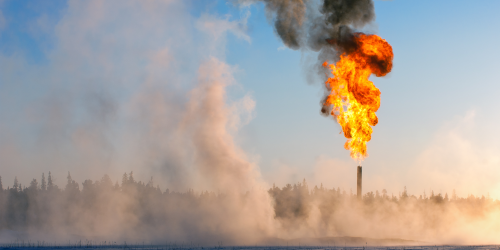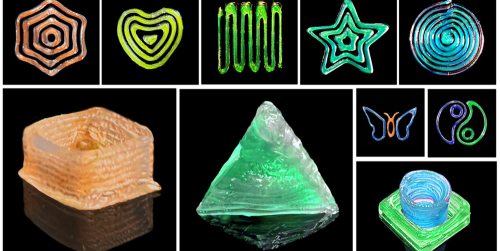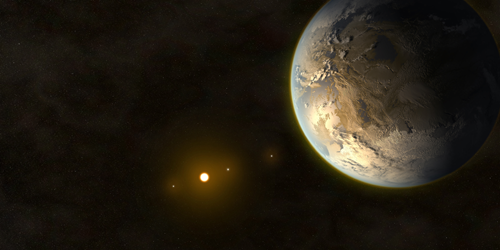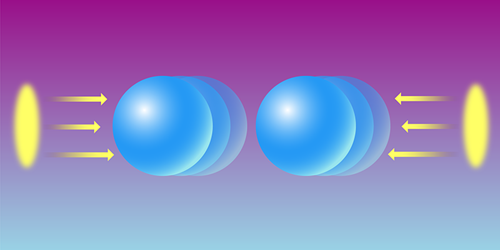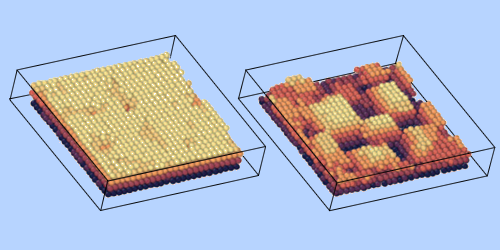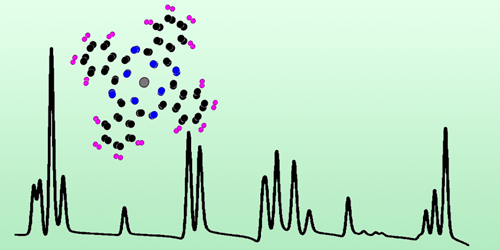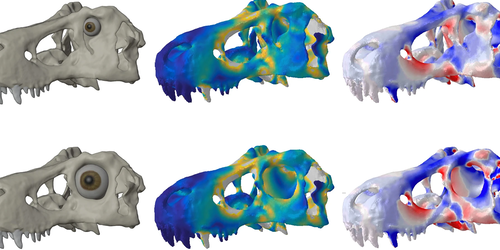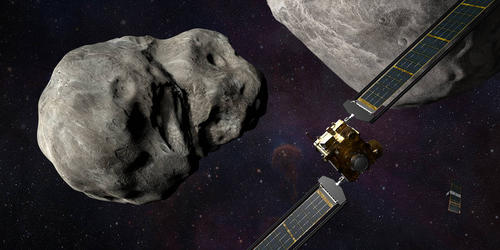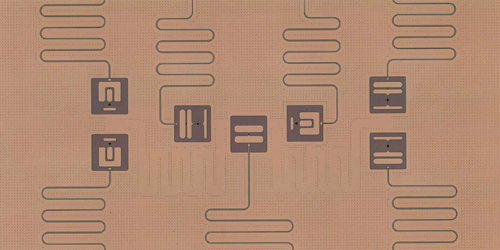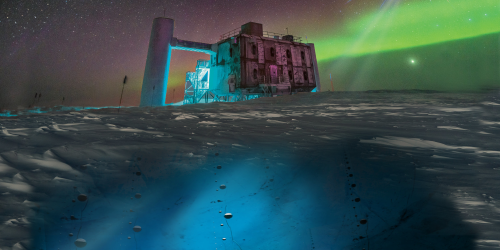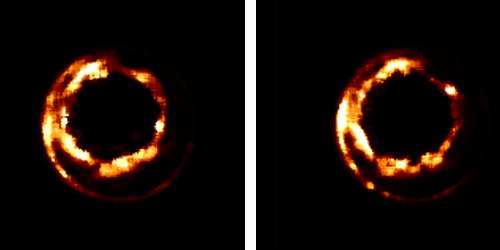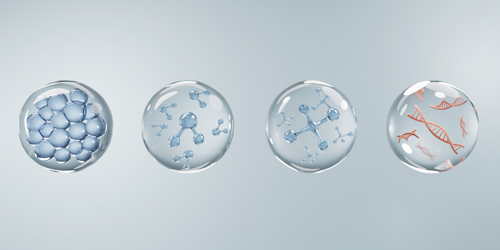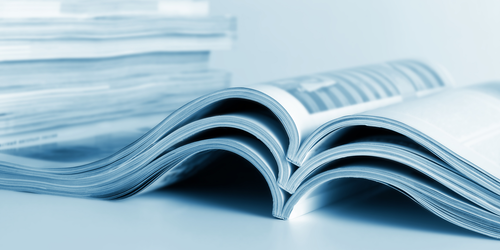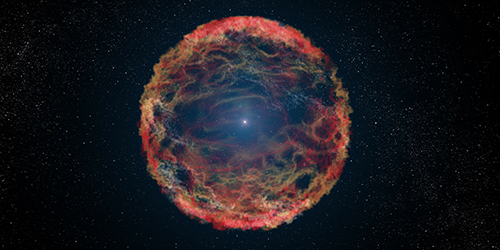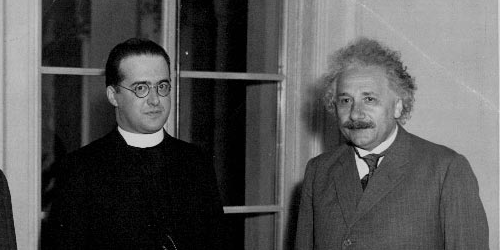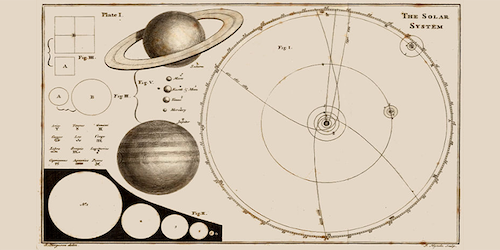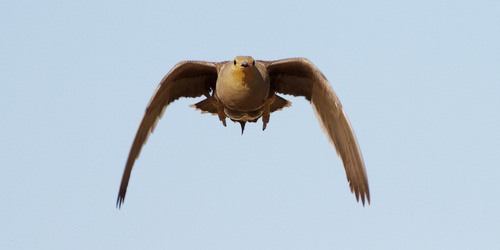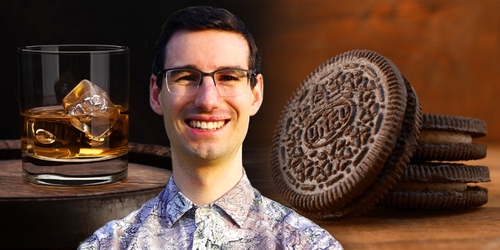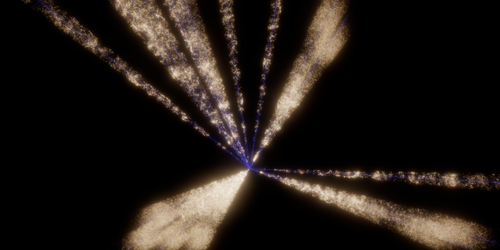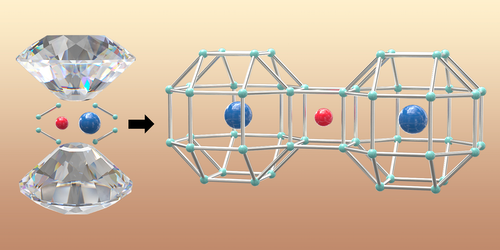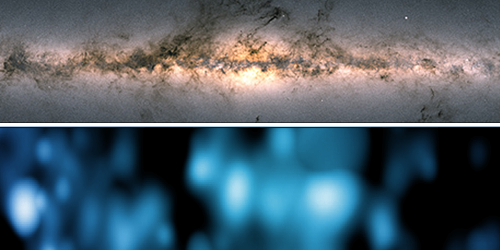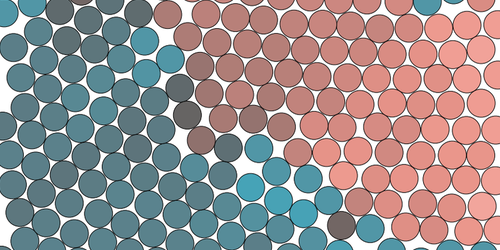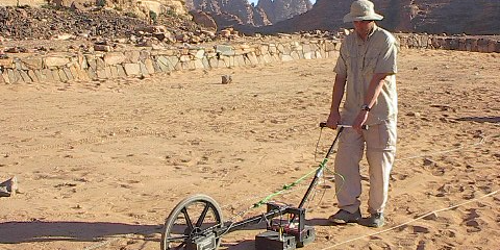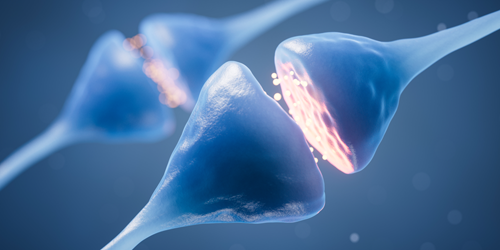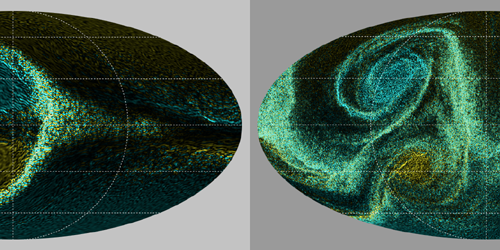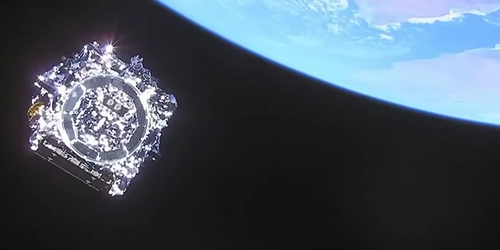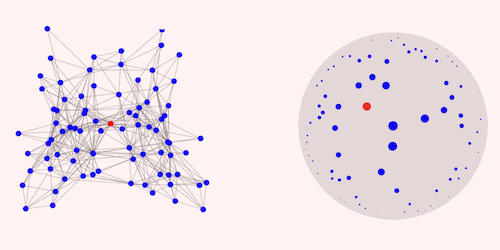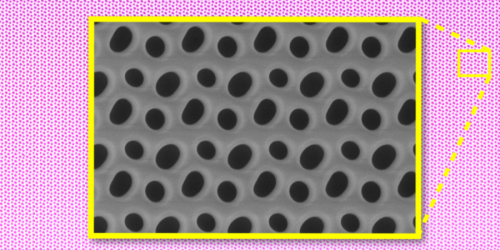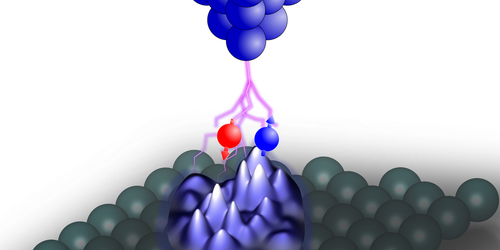Katherine Wright
Highlights from the Physics of Active Matter Conference
At the meeting, researchers presented new models to describe the developing wing of a young fly, colloidal particles that propel themselves, and the liquidlike behavior of cell colonies . Read More »
Complex Crystals Form from Heterogeneous Particles
A suspension containing particles with wide-ranging diameters can crystallize into multiple ordered structures. Read More »
3D Structure Shrinks When Heated
The volume of a star-shaped structure decreases when baked. Combining this technology with more conventional structures could lead to materials that don't expand or contract with temperature changes. Read More »
Photons Brake the Sun
Detailed solar observations and theory suggest that photons remove angular momentum from the Sun, explaining why the Sun’s surface spins more slowly than its core. Read More »
3D Images 10 Times Faster
3D x-ray phase-contrast images take as little as one-tenth the usual time to acquire using a technique that halves the number of required “photos.” Read More »
For Colloidal Glasses, Size Matters
Imaging of the individual particles of a glass reveals the different behaviors of slightly smaller vs slightly larger particles, suggesting new ways to adjust the properties of commercial glasses. Read More »
Winds Can Make a Martian Mountain
Simulations suggest that the mountains found in craters on Mars could have been created by wind eroding large amounts of sediment from a previously flat region. Read More »
A Trio of Magnon Transistors
Three new transistors for spin-based currents may lead to a new type of circuitry that is faster and more efficient than traditional electronics. Read More »
Why Your Pupils Wobble
A model that describes eye behavior during and after a sudden gaze shift could help improve the interpretation of eye motion measurements for cognitive tests and eye-tracking studies. Read More »
Solar Wind Shock Wave Gives Ions a Push
Measurements made by NASA’s New Horizons spacecraft show that shock waves in the solar wind transfer significant energy to ionized interstellar atoms, confirming a decades-old prediction. Read More »
A Home for Helium inside Earth
Computations predict the existence of a compound that could store the primordial helium that is known to be present somewhere inside the Earth. Read More »
Drop Motion Is All in the Bend
A drop of liquid can pull itself along a narrow channel by causing the channel walls to flex. Read More »
A Graphene Waveguide For Electrons
A new waveguide that uses a nanotube to guide electrons could lead to novel types of circuitry in quantum computers. Read More »
Molecule’s Long-Lived Vibration in Superfluid Helium
Trapping a molecule inside a liquid helium nanodrop allows clean measurements of the molecule’s vibrations. Read More »
Hooking a Magnet to an Electron
A device couples the motion of a tiny levitated magnetic particle to the magnetic field of a single electron. Read More »
The Period of the Universe’s Clock
Theorists have determined 10−33 seconds as the upper limit for the period of a universal oscillator, which could help in constructing a quantum theory of gravity. Read More »
Longer Lived Molecules
Researchers merge two atoms into a molecule that has a precise, reversible quantum state and that lives long enough to measure. Read More »
Black Hole Imaging Tests Einstein’s Limits
Sharper images and movies of black holes will allow researchers to probe important physics theories and concepts, including general relativity, in new ways. Read More »
Additional Data Confirms Particle Anomaly
The LHCb Collaboration increases the statistical significance of a result relating to the decay rate of B0mesons that diverges from standard model predictions. Read More »
Microwave Manipulation of Cold Molecules
Interactions between molecules can be tuned using microwaves, a finding that could be leveraged for studying quantum systems. Read More »
Fewer Lasers Achieve Higher Fidelity Logic Gate
Researchers halve the number of lasers needed to implement a quantum logic gate between two different atomic species, a feat that could help to create a scalable quantum computer. Read More »
Liquid-Crystal Vortices Focus Light
Vortex-like patterns of liquid-crystal molecules can interact with light in a manner akin to lenses and might be useful for all-optical information processing. Read More »
Hints of Dark Bosons
A signal predicted for a type of dark matter appears in the spectra of ytterbium isotopes. Read More »
A Twist in Topological Wisdom
New theoretical predictions overthrow the assumption that a material’s bulk topological properties are linked to the same properties at its surface. Read More »
Scientists Take on Poetry
Stuck with how to present your latest scientific project? Try a poem. Read More »
3D Magnetism Maps Reveal Exotic Topologies
A recently developed x-ray-based technique for imaging the spin patterns inside 3D structures uncovers previously unseen patterns. Read More »
Hat Trick Observation for Bosons
The CMS Collaboration confirms that certain particle-smashing events produce three massive bosons. Read More »
YouTube: Physics Friend Not Foe
Physics students use online resources to supplement their in-class instruction and not, as commonly thought, to find the answers to homework questions. Read More »
Viscosity of Active Microtubules Uncovered
Experiments show how to tune the viscosity of “active” filaments found in cells, something that could help in the design of biomimetic materials. Read More »
Hands-On Lab Skills Key for Quantum Jobs
Quantum companies need physicists who can build qubits and not just integrate wave functions. Read More »
A Phase Diagram for Wrapping
Researchers find the conditions for when a cell membrane will wrap around a plastic bead, providing insight into how living things interact with viruses, microplastics, and other objects. Read More »
Experiments Duplicate Mysterious Rock Patterns
Rainwater runoff can erode the surface of a water-soluble rock, scarring it with hundreds of parallel channels. Read More »
Bringing Quantum to Machine Learning
Maria Schuld reflects on the open questions about quantum machine-learning algorithms. Read More »
Physics Lessons from the World of Music
Stephon Alexander draws on his background in music and his interactions with jazz performers to help him “compose” physics models in string theory. Read More »
Shouting in a Political Echo Chamber
Social media interactions with friends and political campaigns can lead to the emergence of polarized echo chambers of thought. Read More »
Lockdowns Cause Pollution Dips
Data indicates that the 2020 spring lockdowns in Europe induced measurable drops in gaseous pollutants. Read More »
How Talking Spreads Viruses
Speech can spray more saliva than sneezing or coughing, a finding that impacts the measures people might take to avoid infection. Read More »
Vibrating Fluids Contain Hedgehogs
Swirling vortices and prickly hedgehog shapes are among the new patterns seen when a fluid containing floating particles is vibrated. Read More »
The Venus Phosphine Debate Continues
Researchers remain divided on the possible discovery of phosphine on Venus, a finding that could have implications for whether life resides on this nearby planet. Read More »
Common Ground in Avalanche-Like Events
Physicists have spent decades uncovering similarities in how disordered materials deform. Now they are trying to apply these results to the design of new materials. Read More »
Where Champagne Gets Its Sound
Researchers have uncovered the specific mechanisms that produce champagne’s crackle. Read More »
Starquake Observations Near Their Teenage Years
An observational target for more than a century, researchers have only very recently spotted “starquakes”—periodic fluctuations in brightness that can reveal secrets about a star’s interior. Read More »
An Octad for Darmstadtium and Excitement for Copernicium
The discovery that copernicium can decay into a new isotope of darmstadtium and the observation of a previously unseen excited state of copernicium provide clues to the location of the “island of stability.” Read More »
Refractive-Index Puzzle Explained
A new theory explains the lack of variation in the refractive indices of atomic gases. Read More »
Busting the “Men are Better at Physics” Myth
Men and women perform equally well in introductory physics courses, according to a new study that looked at the exam grades of over 10,000 students. Read More »
Unexpected Universality in Superconductor Behavior
In contrast with predictions, researchers find no variation in a thermoelectric signal (known as the Nernst signal) for different types of superconductor. Read More »
An Atom Pushed to Its Speed Limit
Researchers have transported an atom between two locations in the shortest possible time, an achievement that has implications for quantum technologies. Read More »
Upping Brightness 1000-Fold
By changing the material commonly used to make devices for generating entangled photons, researchers create a quantum light source that is significantly brighter than others. Read More »
Heterogeneity Matters When Modeling COVID-19
A new model shows that restricting the number of social interactions among members of a population is effective at controlling outbreaks dominated by “superspreaders,” explaining the unexpected success of last year’s lockdowns. Read More »
Hidden Magnetic Structures Revealed
Researchers capture the previously hidden twists of spins in the domain wall of a “proper” antiferromagnetic material, chromium oxide. Read More »
The Past Life of a Protein
Unexpected behaviors of a protein involved in cell division could hint at the possible function of this molecule in earlier life forms. Read More »
Brain Imaging for Autism Diagnosis
An undergraduate student is working to develop an imaging analysis technique for the speedy diagnosis of autism spectrum disorders, which could allow clinicians to start treatment earlier than is currently possible. Read More »
Microalgae: Coming to a Food Near You
Patricia Lopez-Sanchez studies the flow properties of microalgae, with the aim of incorporating this nutritional powerhouse into new food products. Read More »
Women Scientists Are the Rule Rather Than the Exception
A new book shines a spotlight on the historical participation of women in science, showing that women scientists are not anomalies, even if textbooks paint them that way. Read More »
A Rockin’ Time for Space Missions
2021 may be the year of the space rock, with scientists combing through new (and old) samples from the Moon and asteroids, while plans for a pick-and-collect mission to Mars get under way. Read More »
A Lightweight Among Heavyweights
Researchers have observed the lightest uranium isotope to date, offering insight into models of nuclear structure. Read More »
Eye Tracking Gets Complex
Two research teams have used eye-tracking methods to learn how students approach complex physics problems. Read More »
Steering Light Within a Crystal
By shaping the phase of a light beam, researchers demonstrate that they can guide its path through an otherwise light-impenetrable material. Read More »
Lighting Up Heart Cells with Tiny Lasers
A new microscopy technique that uses micrometer-sized lasers can track beating-induced changes in a heart cell’s refractive index. Read More »
A Recipe for Universal Vaccines
Researchers use nonequilibrium statistical physics methods to guide the design of vaccines that are effective against many strains of a virus, a holy grail of immunology. Read More »
Confirming a Cosmic-Ray Bump
The DArk Matter Particle Explorer has made the most precise measurements of galactic cosmic rays to date. Read More »
An Active Particle in an Activity “Well”
A self-propelled particle trapped in a potential well defined by energy availability, has a unique swimming pattern that comes from hidden currents in the fluid in which it swims. Read More »
When Sci-Fi Predicts the Future—and When it Doesn’t
Breaking the laws of nature isn’t the only reason that some science fiction ideas never make it off the written page or out of a movie set. Read More »
Robo-Fish Replicates Real Swimming Action
A robotic fish whose swimming action is initiated in the same way as that of real fish could help researchers test predictions about these underwater creatures, using well-controlled conditions. Read More »
Upgrading a Hybrid Computing Algorithm
Researchers outline a protocol for performing a popular quantum-classical machine-learning algorithm with a so-called measurement-based quantum computer, which could allow for more resource-efficient calculations. Read More »
Demonstrating Quantum Communication Under Realistic Conditions
Researchers achieve secure “real-world” quantum communication along 428 km of optical fiber, the longest terrestrial distance outside of a lab setting. Read More »
Double Take for Photon Measurements
Researchers have made two successive measurements of the same photon as it traveled down an optical fiber. Read More »
Discrete or Continuum? It Matters for Cells
A new model shows that the properties of waves produced in a cell-signaling process strongly depend on whether the cells are considered to be discrete entities or a collective mass. Read More »
Spin Control Without Magnetic Fields
Researchers demonstrate that they can control the polarization direction of a spin current without having to apply a magnetic field, which could aid in implementing energy-efficient spintronics devices. Read More »
Pinpointing the Roots of Extreme Weather Events
A statistical method for fingerprinting the patterns of heat waves and cold spells could reveal whether climate change caused an extreme weather event. Read More »
Corners Are No Barrier to Imaging Tiny Objects
An update to a technique for imaging around corners allows researchers to capture objects out of the line of sight that have a width of a few human hairs, 100 times tinier than previous demonstrations. Read More »
Moving Medicine Out of the Clinic
Engineer John Ho develops wireless technologies for monitoring signals produced by the body, hoping that the devices he creates will enable clinicians to diagnose and treat diseases remotely. Read More »
Improving Clock Accuracy, Bronze Age Style
Researchers may have found the earliest example of humans tinkering with the workings of a clock to improve its timekeeping accuracy. Read More »
3D-Printed Components for Cold Atoms
Researchers demonstrate lighter, smaller optics and vacuum components for cold-atom experiments that they hope could enable the development of portable quantum technologies. Read More »
Repackaging a Mathematically Odd Bottle
Stepan Paul creates mathematically correct sculptures to help teach complex math concepts. Read More »
Physics Abounds at Conference on Math and Art
Quasicrystals, the Markov-chain model, and topological surfaces were just a few of the physics concepts on display at the 2021 Bridges conference. Read More »
Toward Skin-Like Electronics
A technique that allows researchers to fabricate 42,000 elastic transistors per square centimeter takes them a step closer to creating electronic devices that look and behave like skin. Read More »
Turning On a Light Beam with a Single Molecule
A single molecule can switch a beam of photons on or off, a potentially useful function for a quantum computer. Read More »
Images Captured of Colliding Microjets
Researchers have successfully imaged the collision of a pair of micrometer-wide jets made of tin particles. Read More »
A Less Invasive Approach to Rheology Measurements
Researchers have demonstrated a method of probing a soft material’s properties that could allow them to capture those properties more accurately and for smaller systems than current methods. Read More »
Inducing a Curl with a Stretch
Patterning grooves into the surface of an elastic ribbon can cause the ribbon to curl into a tube shape when it is stretched. Read More »
One-Way Spinning Top
Kenneth Brecher designs spinning tops using mathematical constants, including the Feigenbaum constant, which produces a top with a preferential spinning direction. Read More »
Sharing Her Passion for Chemistry and Textbooks
Allison Fleshman teaches her chemistry students how to read textbooks and in doing so instills in them a love and understanding of the subject. Read More »
Teaching High Schoolers How Science Works
The introduction of quantum physics to high school lessons offers educators the opportunity to teach students about how scientific advances are made. Read More »
Quantum Coherence Reduces Friction in Quantum Heat Engines
Predictions indicate that introducing quantum coherence into quantum heat engines can significantly reduce the friction in these systems. Read More »
Nucleon Pairing May Explain Nuclear Scattering Mystery
Preliminary results from new experiments at Jefferson Lab hint at a solution to the 38-year-old nuclear physics mystery of why atomic nuclei have different scattering cross sections than expected. Read More »
1D Random-Field Ising Model Experimentally Realized
Researchers accurately replicate the predictions of the 1D random-field Ising model in an artificial spin ice. Read More »
A Humming Lattice of Cold Atoms
Researchers have produced an optical lattice of atoms that can generate sound, a previously unachieved feat. Read More »
Longer Trapping Expected for Graphene Atom Chips
Predictions indicate that atom chips that use graphene contacts in their circuitry rather than metal ones can trap atoms for significantly longer times. Read More »
Altering Airflows and Stopping Drops
Two new studies provide insights into the efficacy of masks under different usage conditions, results that could help improve strategies for lowering transmission of COVID-19. Read More »
Dark Matter Hunter
XinRan Liu develops technology for dark matter detectors, which he hopes will soon be spotting these mysterious particles. Read More »
Ignition First in a Fusion Reaction
In August, a fusion reaction at the National Ignition Facility yielded a record 1.3 MJ in fusion energy, releasing, for the first time, more energy than the fuel capsule absorbed. Read More »
“Black Hole” of Atoms Observed
Researchers have imaged the long-sought electron charge distribution of a halogen atom, with the picture resembling the bright ring-like structure that surrounds a black hole. Read More »
Multiverse Explanation for Small Higgs Mass
A new model that assumes that a multitude of universes existed when our Universe first formed may explain why the Higgs mass is smaller than traditional models predict. Read More »
Record Lifetime for a Bubble
Researchers created a gas bubble that lived for 465 days, a world record for this type of object. Read More »
A New Route to Generating Black Holes
Observations indicate that a supernova of a “Wolf-Rayet” star produced a black hole—suggesting that the class of black hole progenitors is larger than was thought. Read More »
3D-Printed Magnets Made from Recycled Materials
Using recycled materials to make magnets could allow companies to circumvent supply chain issues for sourcing magnetic objects. Read More »
Waves in a Solid Imitate Twisted Light
Waves of vibration moving through the walls of a pipe can carry orbital angular momentum that could be used for several purposes, according to new theoretical work. Read More »
Fatty Emulsions Go Green
Researchers create a stable dispersion of droplets that contains a high fat concentration using only unrefined, plant-derived materials. Read More »
A Tweet-Packed Day for Poster Presenters
Researchers came together on Twitter for a 24-hour poster conference that allowed them to interact from opposite sides of the globe. Read More »
Physicists Discuss the War in Ukraine
At a special session at this week’s APS March Meeting, people shared stories about colleagues and family members in Ukraine and discussed ways to help those in the war-stricken country. Read More »
Shock Waves Emanate from Dying Black Holes
New black hole simulations that incorporate quantum gravity indicate that when a black hole dies, it produces a gravitational shock wave that radiates information, a finding that could solve the information paradox. Read More »
Sound Speed Measured on Mars
Researchers have made the first measurements of the speed of sound on Mars, revealing that the red planet’s temperature fluctuates on a faster timescale than previously thought. Read More »
Fooling Around with Boxes
Researchers have uncovered the optimal design for a lidded carboard box to ensure that the lid drops as quickly and smoothly as possible—and it’s not what you might think. Read More »
Magnetizing an Atomic Gas with Light
Theorists predict that an atomic gas could be magnetized using only lasers, something that could provide a noninvasive way to quickly manipulate the magnetic properties of the gas. Read More »
Observing the Cosmic Dawn with Hydrogen Deuteride
Researchers have developed a new approach that could make it easier to watch the birth of the Universe’s first stars. Read More »
The Answer is Blowing in the Turbine
Wind turbines have the potential to generate all the world’s electricity once researchers answer open questions on how these towering structures interact with the atmosphere. Read More »
The Lure of Cement
Physicist Ankita Gangotra pours over innovative technologies and policy initiatives to reduce the carbon dioxide emissions of the US cement industry. Read More »
First Image of the Milky Way’s Black Hole
Scientists have directly imaged Sagittarius A*, the black hole at the center of our Galaxy. Read More »
A Supersolid Disk
Researchers have created a disk-shaped supersolid, an achievement that could provide new routes to exploring previously unseen states of matter. Read More »
Turning Back Time on Space
Developments in computer science could allow astrophysicists to reverse the cosmic distribution of matter from today back to any point in the Universe’s history. Read More »
Keeping Women in Physics is More Than a Numbers Game
In intro-to-physics classes containing more women than men, women still feel out of place, implying that more needs to be done to make physics classrooms feel inclusive. Read More »
Capturing the Scientific Impact of Social Media
A survey of UK academics indicates that the true value of research is being overlooked by traditional measures of impact, which largely ignore the importance social media can have in informing people about advances. Read More »
Tracking Nuclear Material Aboard Submarines
Monitoring the fissile material aboard nuclear-powered submarines is notoriously difficult. Researchers may now have a way to safeguard this weapons-grade substance. Read More »
Physicists Set their Sights on Curbing US Methane Emissions
In a report published today, physicists make recommendations for ways to improve the monitoring of industrial methane emissions, something they say could have a significant impact on climate change. Read More »
Brighter Color-Shifting Ink for 3D Printers
Researchers have developed a more vibrant iridescent ink for 3D printers, bringing increased sparkle and shine to the otherwise lackluster objects these devices create. Read More »
Bringing Exoplanets into View
An updated photon detector has a simpler design and higher resolving power than similar devices, opening the way for its use in detecting exoplanets. Read More »
By the Left, Quick March
Predictions indicate that two identical particles can interact asymmetrically with two identical light beams, such that they move off to one side of the system like soldiers walking in formation. Read More »
Curtain Rises on a “Phyusical”
After more than a two year wait, students from the University of Bonn, Germany, will take to the stage for the first-ever performance series of a “phyusical,” a show that mixes singing with live experiments. Read More »
Motion Synchronization Goes Long Distance
Researchers have optically synced the motion of two micrometer-sized objects separated by 5 km, a distance around a hundred million times longer than previous demonstrations. Read More »
Turbulence-Surfing Plankton Can Double Their Speed
Simulations indicate that plankton can gain quicker access to food by riding ascending turbulent ocean currents. Read More »
For the Best Burger, A Quadruple Flip
A new mathematical model predicts when and how often to flip food on the grill to ensure it is cooked to perfection in the shortest time possible. Read More »
Singers, Oboists, and Physicists Orchestrate a COVID-19 Strategy
In an unlikely collaboration, physicists and professional musicians studied how to limit COVID-19’s spread during operatic performances. Hint: It involves instruments wearing masks. Read More »
Colloids Reproduce Interatom Interactions on Surfaces
By epitaxially growing films from colloids, researchers show that they can monitor interactions and behaviors of the particles that are difficult—and sometimes impossible—to capture for similar films grown from atoms. Read More »
Superconductors Give STM a Boost
Using superconducting materials can increase the strength of scanning-tunneling-spectroscopy signals by up to a factor of 50, allowing the detection of tiny changes in a single molecule’s vibrational energy. Read More »
Eyes Provide a Window into the Strength of Dinosaur Bites
Having elongated eye sockets—rather than the more common round ones—could have enabled Tyrannosaurus rex to chomp down on prey without compromising skull stability. Read More »
Laser-Accident-Turned-Surgery-Breakthrough Wins Golden Goose
A team of physicists and clinicians will today be honored for their development of the bladeless eye surgery technique known as LASIK, an advance partly aided by a lab mishap involving an eye and a laser. Read More »
Countdown to DART Impact
In a first-of-its-kind test for planetary defense, NASA’s DART spacecraft is scheduled next week to crash into an asteroid and alter the celestial body’s course. Read More »
New Qubit Enters the Quantum-Computer Arena
A new type of superconducting qubit could solve a “crowding” problem that hinders the development of superconducting quantum computers with large numbers of qubits. Read More »
Longer-Than-Expected Twirls for Polariton Condensates
A polariton condensate can spontaneously rotate, causing it to live significantly longer than individual polaritons would. Read More »
The Gap-Free Helices of Sea Snails
The shells of some mollusk species have compact helical structures that researchers propose develop from the self-assembly of a liquid-crystalline material. Read More »
Listening to Equation-of-State Changes
Simulations indicate that postmerger gravitational waves from coalescing neutron stars could allow researchers to hear the phase transitions between exotic states of matter. Read More »
Neutrino Astronomy Enters a New Era
Using the IceCube Neutrino Observatory in Antarctica, researchers have found significant evidence of a cosmic source of high-energy neutrinos. Read More »
Birth of Turbulence Captured for a Quantum Gas
The observation of the onset of turbulence in a gas of bosons allows researchers to explore how turbulence comes to life. Read More »
Systemic Racism Reflected in Grant Allocations, Researchers Argue
Researchers call for reform in how funding is allocated in response to a study that finds racial disparities in the National Science Foundation’s awarding of research grants. Read More »
Predicting Black Hole Radio-Wave Hot Spots
Simulations of the plasma around a black hole indicate that “magnetic reconnection” could induce radio-wave hot spots that orbit the black hole, a prediction future Event Horizon Telescope measurements could test. Read More »
Predicting the Structures of Proteins
Kathryn Tunyasuvunakool fell in love with computer programming while studying roundworms. Today she uses that passion to help predict protein structures. Read More »
Quantum Steering That’s Robust to Loss and Noise
Researchers demonstrate a loss-tolerant method for so-called quantum steering, a phenomenon that could give quantum communication networks complete security. Read More »
Metal-to-Insulator Transition Similar to Water-to-Ice
A textbook theory for the freezing of water also explains the growth of a new phase in a more complicated phase transition of a different material. Read More »
Quasicrystal with a “Flashy” Origin
A previously unseen quasicrystal has been found in a sand dune in Nebraska, and researchers think it may have been produced by a lightning strike. Read More »
The Uneven Spread of Citations
Minority physicists are significantly undercited compared to their white, male counterparts, which can have serious career consequences. A new tool is allowing researchers to reduce this imbalance. Read More »
Supercooled Drops Have Rocket-Like Propulsion
Ice nucleation in freezing drops can suddenly increase the drops’ velocity via a rocket-like mechanism. Read More »
The Fattier the Surface, the Silkier the Chocolate
New experiments show that the fat content at the surface of a piece of chocolate is the most influential factor in determining the candy’s texture in the mouth. Read More »
Evidence Found for a Majorana “Cousin”
Researchers report the measurement of a “poor man’s” Majorana—a nontopological version of the Majorana fermion—a finding that they hope will reinvigorate the Majorana field. Read More »
Reactor Neutrinos Detected by Water
Researchers have captured the signal of neutrinos from a nuclear reactor using a water-filled neutrino detector, a first for such a device. Read More »
See No Bias, Hear No Bias, Speak for No Change
A study of the attitudes of progressive, white, male physicists suggests that their inaction in confronting biases contributes significantly to the problem of inequality in physics research. Read More »
How a City’s Highway Geometry Evolves
Researchers have identified the traffic thresholds at which cities build urban freeways and ring roads, which could help city administrators refine infrastructure plans. Read More »
A Watery Probe for Ion–Electron Interactions
Researchers have developed a method for measuring the strength of certain ion–electron interactions in water, with initial tests throwing up unexpected results. Read More »
Racial Inequity in Key Publication Metrics
Non-white scientists—in particular Black scientists—are underrepresented on editorial boards, receive proportionally fewer citations, and experience longer review times for their papers, factors that can all impact their career prospects. Read More »
Gaining a Multimessenger View of Supernovae Explosions
Simultaneously detecting the gravitational-wave and neutrino signals emitted during the last second of a massive star’s life could show how such stars die. Read More »
Sorting Ions by How Fast They Move
Researchers predict that a “flashing” electric ratchet could separate same-charge ions by their diffusion coefficients, a possibility that could improve the energy efficiency of processes such as water desalination and purification. Read More »
A Rare Glimpse into a Bygone Era
The resurfacing of a unique video of the physicist Georges Lemaître provides a rare view of a pioneer of cosmology. Read More »
APS March Meeting Goes Overseas
The virtual component of this year’s March Meeting was attended live by scientists at in-person satellite events in Africa, Asia, and South America. Read More »
The Final Piece in the Solar System-Stability Puzzle?
The centuries-long search to understand our Solar System’s stability could now be over, or maybe not. Read More »
Straight Lines for Champagne; Wonky Ones for Cola
Experiments and simulations indicate that bubble size and the chemistry of the liquid determine whether a chain of bubbles rising in a carbonated drink follows a straight path. Read More »
Researchers Recreate a Nearsighted Eye
A new device can recreate the refractive errors of a myopic eye—one that displays nearsightedness—allowing scientists to test lenses designed to slow down the progression of the condition. Read More »
Stuffing Water into Bird Feathers
Researchers have uncovered the details of how the feathers of a desert sandgrouse absorb water, a finding that could aid in the design of water-storing artificial materials. Read More »
From Whiskey to Oreos
When the pandemic hit, Arnold Mathijssen embraced food physics, a field he thinks exemplifies the need for science to become more interdisciplinary and diverse. Read More »
Dark Energy Spectroscopy Instrument Releases First Data
The first data collected by the Dark Energy Spectroscopy Instrument contain close to 2 million objects, including a roughly 12-billion-year-old quasar. The collaboration expects to report their first cosmology-related results within a year. Read More »
Liquid Iron Measured under the Most Extreme Conditions Yet
Researchers have measured the electrical resistivity of liquid iron at a pressure of 1.4 megabars, the most extreme conditions under which this material has been studied. Read More »
Binary Superconductors, Meet Your Ternary Cousin
Researchers have achieved superconductivity in a ternary hydride, widening the material possibilities for high-temperature superconductivity studies. Read More »
Long(er) Live the Fluxonium Qubit
Researchers demonstrate a fluxonium qubit that retains its quantum information for 1.43 milliseconds, 10 times longer than the previous best lifetime for this system. Read More »
Milky Way Viewed through Neutrinos
Using the IceCube Neutrino Observatory in Antarctica, researchers have generated the first neutrino image of the Milky Way. Read More »
Thermodynamics Reveals Coordinated Motors in Sperm Tails
By monitoring fluctuations in the beating of macroscopic sperm tails, researchers retrieve information about the behavior of the nanoscale motors that drive tail beating. Read More »
Two-Dimensional Crystal Found in a Nonequilibrium System
Crystals cannot form in two-dimensional particle systems at equilibrium. A new study has found a regime where a crystal can form if the system is driven out of equilibrium. Read More »
Standard Model Stays Strong for Leptons
New data from observations of B-meson decay again vindicate the standard model of particle physics. Read More »
Radar Resolution Gets a Boost
A low-frequency radar method with improved resolution could aid in the detection of landmines and archeological objects. Read More »
Electricity Generated from Coils and Globules
Researchers transform heat into useable electricity using a polymer phase transition, a behavior they say could be used to improve the energy efficiency of devices such as air conditioners. Read More »
Mismatch with Standard-Model Predictions Reaches 5 Sigma
The Muon g-2 Collaboration has doubled the precision of their 2021 measurement of the muon’s magnetic moment, strengthening a tension with predictions based on the standard model. Read More »
A Toy Model to Probe Career Mobility
A new model could predict the impacts of policy changes on career progression prior to their implementation. Read More »
The Mystery of “Strange” Metals Explained
Some metals display an unusually high electrical resistance. Researchers now have an explanation for why. Read More »
Restructuring Classes Can Level the Playing Field
A study of university-level physics classes shows that changes in course structure can help to eliminate grade gaps between student groups with different races, ethnicities, or genders. Read More »
More Informative Together Than Apart
The concurrent analysis of two measurements of a biochemical signaling network can provide more information than two separate probes of the datasets. Read More »
Metallic Gratings Produce a Strong Surprise
Using a metallic grating and infrared light, researchers have uncovered a light–matter coupling regime where the local coupling strength can be 3.5 times higher than the global average for the material. Read More »
Turbulent Jets Doubly Detrimental to Fluid-Based Batteries
Jets that develop along the walls of fluid-based thermal-energy-storage systems induce multiple flows that limit the devices’ ability to store energy. Read More »
Narrower-Energy Electron Pulses without Electron Loss
Researchers demonstrate a method to reduce the energy spread of electrons used in electron microscopes, opening the door to time- and energy-resolved studies of quasiparticles such as phonons and plasmons. Read More »
Crazy Ants Behave like Active Swimmers
A group of 100 ants moving a heavy load acts like a single self-propelled particle swimming though a fluid. Read More »
Linking a Respiratory Drop’s Size to Its Origin
A parameterization scheme that links a drop’s size to its origin in the respiratory tract could help clinicians identify the most effective mitigation strategies for halting the spread of an infectious disease. Read More »
The Skinny on Detecting Life with the JWST
Using data from the spaceborne JWST, researchers can infer the contents of exoplanet atmospheres—with potential implications for the habitability of these worlds. Read More »
Milky Way Pulsars Rule Out Some Extremely Light Dark Matter Particles
If ultralight dark matter particles exist, they can contribute no more than 70% of the dark matter between Earth and a set of monitored pulsars. Read More »
How Opinions Become Chaotic
Sarah Marzen finds that potential sociological strategies for combatting the spread of disinformation can have the opposite effect, leading to a population with more polarized or chaotic views. Read More »
Now You See It, Now You Don’t
A fluid phenomenon seen daily in kitchens has been found to exhibit unexpected behavior. Read More »
Liquid Veins Give Ice Its Road-Wrecking Power
The unfrozen water-filled channels that crisscross multicrystal ice help feed ice growth, which can lead to fractures in materials such as asphalt and cement. Read More »
Symmetry Violation Predicted for Bottom-Containing Baryon
Researchers predict a large “CP” violation for the decay of a baryon that contains a bottom quark, a finding that has implications for how physicists understand the Universe. Read More »
“Deep Heating” of a Jupiter-Like Planet Causes New Storm to Blow
Supercomputer simulations of the weather on a hot Jupiter reveal a previously unseen storm pattern in which cyclones are repeatedly generated and destroyed. Read More »
US Particle Physicists Make Their Wish List
A report from a panel of particle physicists lays out a roadmap for the future of their field. Top priorities are a cosmic microwave observatory and a muon collider. Read More »
Disruptive Discoveries More Likely between Scientists Who Meet Face to Face
Collaborations between scientists at far-off institutions are less likely to produce breakthrough discoveries than those between scientists who can meet face to face on a regular basis. Read More »
A Collective-Behavior Model for Mice
A new model reproduces both the dynamical and steady-state behavior of a group of living organisms, a first for such systems. Read More »
A Soap Bubble Becomes a Laser
Using a soap bubble, researchers have created a laser that could act as a sensitive sensor for environmental parameters including atmospheric pressure. Read More »
Squeezing More out of Atomic Clocks
Quantum effects can nearly double the precision of a state-of-the-art optical atomic clock, a finding that could allow the devices to search for possible fluctuations in fundamental constants of the Universe. Read More »
Characterizing the Swimming Gait of a Bacterium
A new technique could allow researchers to distinguish the swimming motion of a species of microorganisms without the need to track individuals within a population. Read More »
JWST Sees More Galaxies than Expected
The new JWST observatory is revealing far more bright galaxies in the early Universe than anyone predicted, and astrophysicists have more than one explanation for the puzzle. Read More »
Probing Chiral Molecules with Their Own Electrons
A technique that can determine the chirality of a molecule using that molecule’s own electrons could allow researchers to probe the dynamical behavior of chiral molecules on very short timescales. Read More »
Five New Isotopes Is Just the Beginning
Less than a year after its opening, the Facility for Rare Isotope Beams produced five never-before-seen isotopes for observation, a success that researchers say highlights the discovery potential of the facility. Read More »
Ableism Puts Neurodivergent Students at a Disadvantage
While undergraduate physics students that identify as neurodivergent report little outright discrimination or violence, they do say that structural ableism has negatively impacted their time as students. Read More »
Zero-Resistance State for a Potential High-Temperature Superconducting Nickelate
Researchers have measured a zero-resistance state for the nickelate La3Ni2O7, which measurements suggest may superconduct at temperatures above the boiling point of liquid nitrogen. Read More »
Black Hole Portraits Will Become More Frequent
The release of a second, higher-resolution image of the supermassive black hole M87* marks the start of what researchers hope will be an era of many more black hole photos. Read More »
Heavy Element Quandary in Stars Worsened by New Nuclear Data
A widening gap between the cerium-140 abundance predicted by theories and that measured in observations of certain stars indicates a potential need for updated models of element formation. Read More »
Seven Astrophysical Tau Neutrinos Unmasked
Scientists have found seven astrophysical tau neutrinos—particles that are notoriously difficult to detect—in an analysis of data from the IceCube Neutrino Observatory in Antarctica. Read More »
A Pathway to Making Molecular Oxygen That Doesn’t Involve Life
Researchers have quantified a pathway for the formation of molecular oxygen from the interaction of carbon dioxide with electrons, key information for searches of life on other worlds. Read More »
Electrochemists Wanted for Vocational Degrees
Paul Kempler runs a master’s program at the University of Oregon that provides hands-on electrochemistry training for those wanting to enter the field without them having to take a five-year-long PhD. Read More »
The Path to Making Batteries Green
For Shirley Meng, the biggest barrier to achieving sustainable batteries is sociological not technological, requiring a change in mindset about how we consume and dispose of batteries. Read More »
Alleviating the Stress of Finding a PhD Advisor
At many US universities, no formal procedure exists to help physics students pick a PhD project and a supervisor. Researchers argue it’s time for that to change. Read More »
Lanthanum Less Abundant Than Previously Thought
Measurements related to the production of lanthanum in stars where elements are thought to form via the “i process” indicate that less of the element is produced than models predict. Read More »
An Elusive Black Hole Comes into View
Observations of seven fast-moving stars at the center of a dense star cluster in the Milky Way reveal the presence of an intermediate-mass black hole, perhaps the most puzzling class of these dark objects. Read More »
Noninvasive Alternative to Cancer Biopsy
Researchers have developed a cancer-detection method that uses painless sound waves, rather than a torturing needle, to obtain genetic information about a patient’s cancer. Read More »
Social Networks Key to LGBTQ+ Physics Students Making It Through Grad School
A new survey shows that affinity groups provide crucial support to women and LGBTQ+ physics PhD students—groups that continue to experience harassment and hostility. Read More »
Physicists Needed to Help Advance Cancer Treatment
Marie-Catherine Vozenin explains why an interdisciplinary approach is key to taking a promising experimental radiotherapy cancer treatment from the lab to the clinic. Read More »
Antiferromagnet Magnetized with Light
Researchers show they can magnetize an antiferromagnet using terahertz light, switching the state on a million times faster than is possible for other magnetic states. Read More »
Biological Magnetic Sensing Comes Close to Quantum Limit
Researchers find that two types of biological magnetic sensor can sense fields close to the quantum limit, a finding that could guide the design of lab-made devices. Read More »
Strange Swapping Behavior Defines New Particle Candidate
Researchers predict the existence of a class of particles that behave differently from those already known. Read More »
Robotic Vacuum Cleaner for Microplastics
Seong Jim Kim and Myoung-Woon Moon of the Korea Institute of Science and Technology have developed a device that can “vacuum” up tiny pieces of plastic floating on the surface of a body of water. Read More »
Cooking Flawless Pasta
Scientists have pinpointed energy-efficient ways to cook al dente pasta and developed an infallible recipe for the perfect cacio e pepe sauce. Read More »
Gauging Edge Instabilities in Future Fusion Reactors
Researchers are unraveling the influence of energetic particles on the stability of plasmas in fusion reactors. Read More »
Nonchiral Clusters Self-Assemble into Chiral Films
Researchers have demonstrated a method to create circular polarizing films from nonchiral nanoclusters that form spiral chains during drying. Read More »
Gender Gap in Recognition Prevails
When men and women physics undergraduates receive the same amount of recognition from their peers for being good at physics, men report significantly higher perceptions of peer recognition than women. Read More »
Encapsulation with Noble Metal Improves Superconducting Qubit Performance
The quantum properties of superconducting qubits might be improved by coating them with a noble metal such as gold. Read More »
Altermagnets That Turn On and Off
Researchers have proposed methods to tune the properties of altermagnets, a step toward practical applications for this new form of magnet. Read More »
Lensing Candidates Stand Out in Euclid Mission’s First Data Release
The Euclid satellite released its first trove of galaxy data based on seven days of deep-field observations in three sky areas. Read More »
Desert Locusts Follow Unexpected Motion Rules
New experiments with virtual reality suggest that locusts do not follow traditional rules of collective behavior. Read More »
A Potential Tool for Diagnosing Alzheimer’s Disease
Transforming an MRI brain scan into a hyperbolic network of nodes allows researchers to detect brain connectivity disruption caused by Alzheimer’s disease. Read More »
Reducing the Dark Current
Researchers have demonstrated a method for suppressing unwanted electrons in bright electron beam sources. Read More »
Sifting Junk for Dark Matter
Elena Pinetti searches for dark matter using JWST calibration images that other researchers discard. Read More »
Aiming for Lighter Light Sails
Researchers are developing highly reflective thin films that could be installed on small light-propelled spacecraft. Read More »
Superconductivity Traverses a Single Molecule Bridge
A single molecule provides a controllable connection between a normal metal and a superconductor. Read More »




























